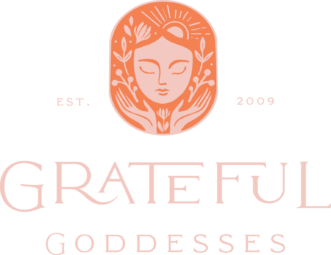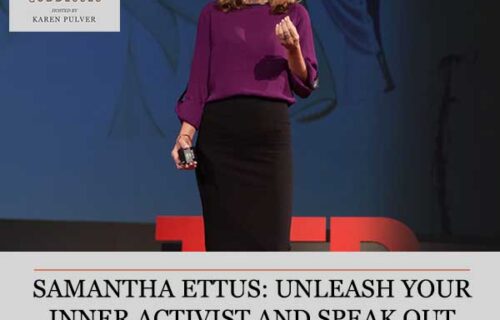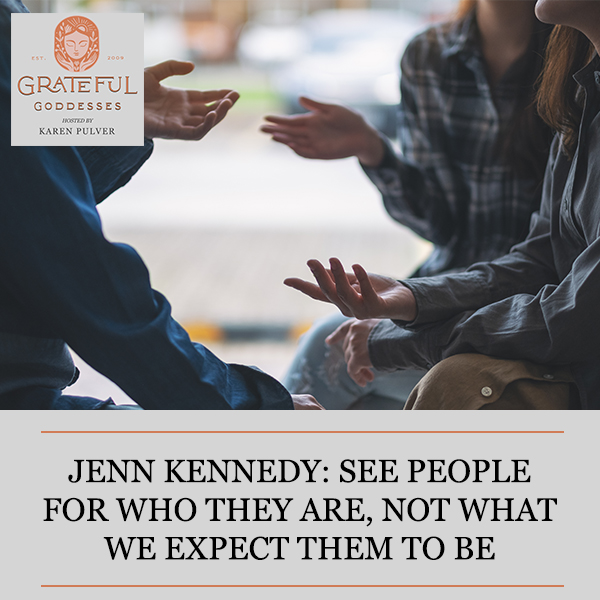
Jenn Kennedy: See People For Who They Are, Not What We Expect Them To Be
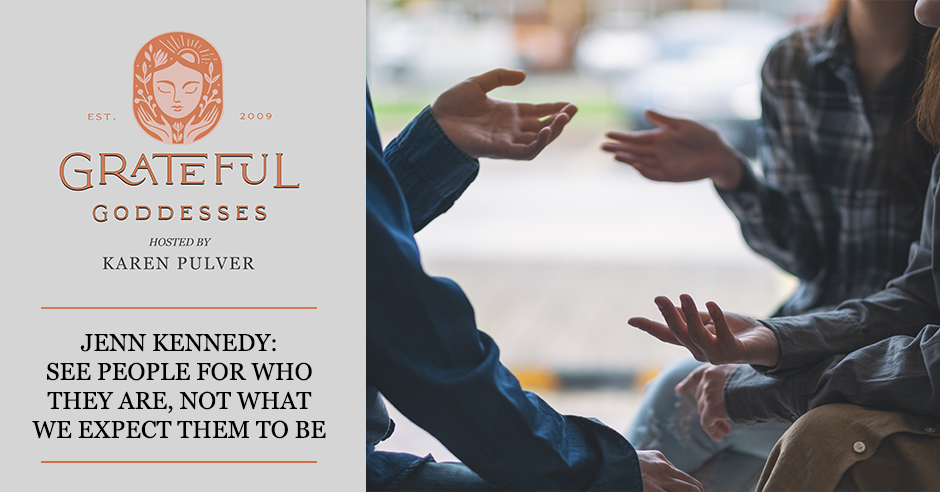
What questions do you have about sex and gender? What is sexual addiction/compulsion? How can speaking to a sex/gender therapist help an individual learn to have more sexual satisfaction in their lives? In addition, if an individual is recovering from childhood sexual abuse, in what ways can a sex/gender therapist also aid in helping individuals understand and cope? Listen as Karen Pulver and her featured Goddesses speak candidly with sex/gender therapist Jenn Kennedy about all these issues, including the danger of the all popular “gender reveal” and how perhaps parents can open their consciousness for “let’s let the individual decide their gender when they grow up.” However your opinion is on sex and gender, listen to Jenn on this episode as we learn to see people for where they are and not what our expectations of them are supposed to be.
—
Watch the episode here
Listen to the podcast here
Jenn Kennedy: See People For Who They Are, Not What We Expect Them To Be
A Conversation On Sex And Gender, Gender Reveals, And Sex/Gender Therapy
Thank you so much for joining us. We are so glad that you are here. We are honored to be speaking to Jenn Kennedy. In her private practice, she specializes in sex and gender that translates to sex therapy both for individuals and couples, sex addiction, compulsion, issues with porn, infidelity, prostitution, and LGBT. With these specialties, she has an interesting mix of clients. Her practice has expanded to those looking for more sexual satisfaction and who are also recovering from childhood sexual abuse.
She’s a certified sex addiction therapist, trained in EMDR and works in a variety of modalities depending on the presenting issue and the disposition of the client. She is working on a PhD in clinical sexology. She has taught intimate relationships, couples work and human sexuality in the graduate school of Antioch University Santa Barbara. Her practice is called Rivier Therapy and under this umbrella, she supervises three up-and-coming clinicians who are interested in sex therapy, couples work and sex addiction specializations. Thank you so much for joining us at the show, Jenn.
Thank you for having me.
We have so much to cover with this topic. You have quite an umbrella of what you do. Can you tell us a little bit about yourself and how you entered into this profession?
I know it is a broad range but part of that is me being in a small town so I get to have these specializations because we have fewer people that need more services. I went back to graduate school late when I was 40. I knew I was going into it because I wanted to work with couples. That was my focus. A natural outgrowth of working with couples is sex. Couples often come in with issues around sex and sexuality. That became a hyper-specialization that I gravitated to and that most clinicians seem to shy away from. It has been a rewarding choice. There’s a great need for it.
Especially with people who are coming out more seems and identifying, feeling comfortable saying who they are. If they were born a certain way, deciding, “No. That’s not how I feel. That’s not who I am.” The goddesses and I are curious about your work with LGBT.
That has been a long journey. I lived in LA for many years. I was an activist light. I grew up in the ‘90s and early 2000s around the community. I have always had an interest in the soft spot for those people because they are underserved. I’m seeing an uptick in trans clients coming in looking for support at all ages. Initially, it was more youth but I’m seeing people throughout the lifespan coming in.
Do you think that wasn’t as available and it’s becoming more available in the years with sex therapy? Why do you think that so?
There aren’t a lot of competencies, specifically for trans people. People don’t have that lived experience. Many clinicians do not. The training wasn’t available and it’s getting better as more visibility and more competency happens. Clinicians choosing to actively go get experience outside of their lived experience is valuable. Historically, that section got little representation and support.
For people that are in a different age like the older generation, for example, grandparents, I have heard personal stories of grandparents having a hard time switching pronouns because they are set on, “My granddaughter. My grandson.” It’s hard to say, “They,” for that generation, at least the people I have come in contact with on a personal level. What are your suggestions for our society in general? We want to respect how a person feels and how they would like to be identified. I’m talking more about an older generation that’s struggling to talk that way, then how can we help support the individual, who is trans to deal with this type of situation?
It’s supporting both of them. It takes some time. It’s a transition of using a new pronoun. I don’t know if you have ever had a friend that suddenly went by a nickname or they went off to college and they came back with a different name. Even that’s hard to get used to. Pronouns have been a little bit prickly and challenging, not for the older generation but for parents too. Sometimes peers but younger people tend to see the world less binary. They are more skilled at navigating that.
Like most things, it takes focus and intention. When you look at a person for who they are, it starts to get easier because if you are focused on how they identify, it starts to click it and that’s the way you see them. It requires some will because the pushback that I see is typically like, “That doesn’t make sense to me. I shouldn’t have to. This doesn’t feel like my job.” If you are going to love somebody, if you are going to be in someone’s life, that’s a fair and reasonable request to get their pronouns right.
I know of people who are having a hard time. Professor Jordan Peterson in Toronto, I don’t know if you’re familiar with him, refused to call an individual in his class by the chosen pronoun that that person asked for. He was adamant on saying, “No, we shouldn’t have to change.” That’s his opinion but there was quite a push back to him as well. It’s like, “What do you mean? You need to respect a person for how they choose to be called. If their name changes, you are going to call them by their new name. It’s the same with the pronoun.”
There are lots and lots of questions to dive into. Thank you so much for being patient with us because I don’t want our readers to feel like there isn’t a question that can’t be answered or feel badly about asking questions and feel judged by asking questions. I know you and I had a conversation before this interview and I was asking you different things I felt ignorant about. I said, “I want to know so I know how to move forward with a lot of different topics with sex.” Let’s not be scared and ask these questions. Let’s bring on our featured goddesses to join us in this discussion with Jenn. Camille, what would you like to ask Jenn?
We need to start to have more allowance for difference – that's who we are. Share on XThere are many different things to unpack. When I was hearing you, you used the example of changing names. I remember I went through a phase where I tried to change my name and it didn’t catch on. I feel like there are so much more to that because when it comes to gender and even with gender reveal parties, there are so much more of that because people have their own expectations, visions or stereotypes. While we have you here, it’s a great opportunity for you to maybe share a little bit more on how people can try to see people where they are not what their expectations, stereotypes, own phobias or isms, as it may be getting in the way.
The gender reveal is a perfect example. It’s one of those situations where right from the beginning, as soon as the bump starts to appear, people say, “What is it? Is it a girl or a boy?” There’s no room in our consciousness for, “It’s both. It’s neither. We are not sure. We are going to let it decide as it grows up.” From the beginning, we are projecting. That’s what you are describing. We have expectations and we project them onto others.
Parents do this all the time, “I expect you to be this,” including what it means and what we have assigned culturally to be a girl or a boy. There are more permission to have a range, especially when you are born medically female to have a range of presentations. Boys don’t usually get to have as much range. We have all known tomboys. We have known people with a range of presentations. If we can start to have a little more allowance for difference, for people to look, act or dress in ways that aren’t typically what you would see because that’s who we are.
I would love to piggyback on that where there’s a movement going on over in the UK. I am sure I’m not going to mess up her name because there are so many names at this point of women that have been attacked where they are making a point of trying to center the conversation on putting it on male violence as opposed to always putting it on women being the victims. It’s our cross to bear as far as, “What was she wearing? What was she doing?” To add to that gender element of it. As much as we have these expectations that sometimes being able to live in those expectations of maybe owning your femininity, being able to walk at night safely and not worrying about the over toxic masculine energy that’s following you. Maybe there are footsteps. Can you also speak a little bit more about that as well? How are people handling that, especially now on the pandemic?
It’s more from the standpoint of the responsibility of women and typically that women hold to keep themselves safe and to not be too attractive or, “She caused it by the way she looked at the way she dressed.” That always makes me cringe.
“What was she drinking?”
I hate to say it but this goes back to some biblical stuff about women, taunting and inviting men. It’s the man’s responsibility to manage himself. Yes, we all send signals and there are lots of signals that are nonverbal, what we wear, how we speak and behave is part of it. The responsibility has to be shared. I don’t think anyone deserves victimization. Consensuality is credibly important and regardless of what she chose to wear or how much she drank, he still needs to have consent. That gets lost when blame starts to get assigned.
I was also thinking about how we raise our children so differently in the sense that women are automatically raised to be empathetic and those expectations with the gender reveal and all of that leading to now. Now, we are trying to flip that narrative.
Women are raised to be accommodating, pleasing, flirtatious, desirable and attractive but not too attractive. “We want you to be sexy.” This is the Madonna-whore problem. “We want you to be attractive enough to want to have sex with you but we don’t want anyone else to have sex with you but we want you to appear you are pure and clean.” We get a lot of mixed messages especially in the United States in this culture. The advertising is sexy. Porn is sexy. Women are also expected to have a certain amount of manners and appropriateness. It’s a fine line to walk on.
I experienced it. I was at a bar with some girlfriends. I have been happily married for a couple of years. We were having fun, drinking and dancing. The power went out in the bar so it was dark and we were still dancing. I had this gentleman that I was dancing with at the bar. We were all dancing altogether. He thought he could do this and gave me a good pinch underneath. I remember feeling like I didn’t know what to do. I was like, “What?” He was laughing and he was like, “It’s all in good fun.” I was like, “We are out of here.” I grabbed my friends and we left. In the cab ride home. I was like, “What did I do to deserve that? How did that happen? What did I do? Did I maybe flirt too hard? We were having fun.” I agree with you that it was my space. He should not have invaded it. Maybe I should have turned around and slapped him? I don’t know.
At that moment it’s tricky. This is also the dynamic that sometimes plays out. It’s interesting with sex therapy, is that people have to come in and say, “This is what’s not working. This is the person I’m afraid to be. This is what I feel. This is what I don’t feel and I want to feel.” There are so many messages out in the ether and the universe. When you are trying to be with an intimate partner, it’s quite confusing. It’s all mixed up.
Michelle, what would you like to add?
I want to go back to the LGBTQ component and I’m hoping that maybe you can clear up some misconceptions about people who are trans. People automatically think that that has to do with their sexual preference. I’m sure maybe in some cases but I don’t believe that it does but people seem to automatically go there. What’s your thought on that?
It’s confusing for people. The acronyms are SOGIs Sexual Orientation and Gender Identity. There are two different things. Sexual orientation is who you are attracted to. Gender identity is what you feel like. Your trans identities say you were born biologically and medically female and you have transitioned to male so you are male but who you are attracted to is a different thing. That’s not your body. That’s your heart and mind. Who are you drawn to? It doesn’t matter what’s happening over here. It doesn’t influence over here. That’s what’s confusing to people.

The other thing that gets confusing is queer now is the catch-all for all of it. If you are L, G, B, or T and that T can include a non-binary. Meaning you don’t see yourself as male or female or fluid, you transition back and forth. Some days it’s more of this and some days more than. Queer is the catch-all. If you are gay, lesbian, bisexual, you are questioning or you are trans. People conflate the two and I can see how it gets confusing but there is a distinction so you have to ask. You can’t assume because somebody is a trans male that they are going to be gay or straight.
On that note, you say LGBT, I know people who identify as queer. Are you saying that that’s no longer a useful term?
No, it is. Queer is reemerging because if you are over 45, you also get a little nervous when you hear the word queer is a slur. It was not a compliment but it has been reclaimed. It’s a catch-all for the whole community but when somebody says they are queer, that doesn’t tell you everything because are they queer in the way that they are bisexual, in the fact that they are trans or because they are a lesbian? You don’t know. Queer is the catch-all and the youth are using it a ton so get you are ready.
That’s not an issue.
It also depends on where you are because where I live, it’s questioning. It’s not queer for the Q.
The Q is Queer or Questioning. There’s intersex and there’s an ally.
I am heterosexual but the women’s body is beautiful and I love looking at a woman’s body. What does that mean? I’m not attracted sexually but I think that women are beautiful.
You are a human. That’s an honest perspective. Just because someone is gay doesn’t mean they are attracted to every male. You can appreciate the beauty of a person without objectifying and sexualizing.
I have talked to teen girls about that as well. I had someone approached me that asked me that and she herself was questioning well, “Am I gay? I’m not sure.” I was trying to work her through it and I said, “I also love the female body. I don’t feel like I’m attracted that I want to go have sex with a female.” I’m happily married.
Attraction is a funny thing. That is what’s always confusing to people when let’s say a woman leaves her husband and comes out at 40, 30, or something and they were like, “What?” Attraction is a funny thing. Some people feel it young and they know when they are 12, 18, they are off to college or they are experimenting. For some people, it’s about the person they meet along the way. Suddenly, they are feeling those tingly feelings and they are like, “I want to make out.” They can’t go the whole distance initially in their mind because that doesn’t even translate as an option. I have seen all kinds of things. Most people are a little more in the range of some flavor of bisexuality than not. I don’t think most people are on the strict ends of the binary of stream.
The advice that I gave to this individual was, “Go with your heart. If you are attracted to someone of the same sex and you love spending time with that person and they happen to be the same sex as you then go with it but if not, it’s about your heart.”
On the flip side, I’m single. I was on a date. Being in San Diego, we were at the beach. We were having a meal sitting at a table. It was our first date and he kept pointing out men to me who were shirtless because they were surfing or in a bathing suit going, “Look at his body.” I’m thinking to myself, “I don’t think he’s with the right person.”
Maybe he was feeling a little insecure. If girls were walking around in bikinis everywhere, you might be like, “Whoa.”
Good for him. I have no problem with that but I wasn’t interested anyway, which made it easier. Maybe it was the same thing though. Maybe he was somebody who happened to appreciate it. It was interesting.
Women are expected to be sexually attractive and yet have a certain amount of manners and appropriateness. It's a fine line to walk on. Share on XYou have no idea what’s going through people’s minds. I hear the craziest things on the regular and I’m like, “Let’s go with that.”
I wanted to transition now to a new topic of sexual addiction because you do work with sexual addiction and I have a lot of questions about that. It’s a tricky area because some people are like, “Yes, it’s an addiction.” It’s not someone being unfaithful and some people are thinking it’s totally wrong and, “How could a person do that?” I’m curious what your thoughts are and how you handle sexual addiction when clients come to you either the person who has the addiction or the partner that doesn’t?
I see both. Some therapists usually specialize in one or the other but in a smaller market, I do both. The other thing is I know a lot of people recoil from the word addiction. Compulsion is another way to frame it. Even if that’s going on, I’m never permitting the bad behavior. I want to say that from the outset. There’s a distinction between, “I like hooking up a lot or I like watching some porn and I’m an addict.” There’s a big gap there are some criteria that we are looking at that match the criteria that we look at for substance use disorder or substance addiction.
It looks like a lot of impulsivity and compulsivity. They are doing it even though there have been consequences like people in your family are saying, “Please stop. This is hurting me.” It’s risk-taking. It’s what we call tolerance. What used to work doesn’t work anymore? You have to escalate and do more. It starts to look like a pattern of behavior that’s problematic and it’s out of control. It’s one thing if somebody has to watch porn on occasion. I see a lot of young adults in their twenties dating, sleeping around, having a lot of ambiguity. I don’t worry. I don’t bristle at that.
We look at the whole profile of that and how much damage has it caused because usually, unfortunately, these people do not present until there are consequences. They don’t usually come in and say, “I want to stop.” The consequences will be erectile dysfunction, their wife found everything on their computer and they are getting blackmailed because of something. There are consequences. There’s a little bit of a crisis when they come in. That’s creating some motivation to change.
How do you help the individual, the partner that’s on the other end?
Sometimes I see the addict, the partner or the couple. It depends on who’s referred to me. When I’m helping the partner, it’s a different approach. It looks like PTSD. Honestly, she feels crazy sometimes and looks a little crazy because she’s riled up. She has probably gaslit quite a bit. What you think is happening isn’t happening when it is. She probably hasn’t had a lot of closeness and genuine partnership in quite a while. She’s more shell-shocked, vigilant, looking for things a lot of times being like a sleuth. It’s a painful position. That’s more on trauma reduction and helping them orientate themselves and going forward, create a plan, safety and expectations. It’s a whole different way of working.
You say she. Does it not happen in the reverse?
It does but not often and I don’t think I have ever worked with a male partner. I have worked with a few women who are addicts, who are having affairs but I have never seen a male partner but they do exist.
Camille and Michelle, do you have any questions on that topic at all?
It’s more of a statement. I can’t help but wonder if there’s probably a little more shame with a male or the person whose wife is having the affair and who’s addicted so perhaps you don’t see clients. I’m wondering who is going through trauma because maybe people feel ashamed to be that “victim” is interesting.
The partner’s reaction is all across the board. Sometimes it’s rage. They are coming in with guns blazing. They want to get into it, hold this person accountable and be punitive. Sometimes they are so devastated and wounded. It is quite a range of presentations.
How do you help women get past that trauma? I know you do EMDR, which I happen to think is a phenomenal thing. I have done it but what are the other ways that you would help people get past the trauma? I think it is a trauma.
There’s this process that we are trained to do called disclosure that oftentimes we work toward if the addict is willing. That’s part of it too. If there are too much damage and the couple are blowing apart, that’s one thing but if they are going to try to make a go at this and do some repair and maybe move forward together, then I do recommend disclosure with CSAT, Certified Sex Addiction Therapist. It’s a process where we prep both partners and we come together. It’s brutal. The four of you because each person has their own therapist and the addict prepares a document that’s usually quite lengthy, that discloses everything they have ever done and it’s detailed.

The partner has all the information and it’s contained. They know it and they can decide going forward, “Can I move forward with this person?” That’s the beginning but we do a lot of grounding and a lot of resourcing first because that’s a hard thing to handle and hear. It’s the trauma reduction and also creating ways to feel safe again. Some of that is relational with the partner in terms of, “Can I check your phone? Can I have location services turned on so I know where you are? Are you being consistent and following through on where you say you are going to be when?” It’s all that stuff so it starts to feel like, “I do know what’s going on here.”
What about the woman who doesn’t stay with that partner? They are on their own. They have done a little healing, trying to find love but they are still struggling and they still feel the trauma? How would it be any different?
It’s different because the source of the hurt is no longer their partner and yet there’s that residual concern and vigilance. It’s a slow process. I would say getting to know a new person, go slow and trust your gut. Women sometimes don’t trust their gut. In these moments, trust your gut, if it doesn’t feel right. Transparency is important. Not that we need to know every single thing about our partners but there should be a certain level of transparency that feels available. Be aware of how you might be triggered. Don’t think you need to tell your whole history to a new person but have some awareness that this is where it’s coming from. It’s like, “It’s not that I don’t trust you. It’s that I don’t trust. You are part of that so ideally, you would give me a little extra safety along the way.”
Does that lead to people, women or men who had suffered sexual abuse and how they are coping and dealing? Is that how you work with them as well to trust again?
I have so much respect for that population that I have worked with both men and women who had childhood sexual abuse and intimacy. I will also say for the sex addict, honestly, intimacy is difficult. Intimacy being in a close, sustained, honest relationship with somebody. They don’t know how to do it well. With childhood sexual abuse, typically, there is a distancing. There are issues about power and control. There are issues of self-worth that typically come up. EMDR can be powerful in repairing some of those negative cognitions about worth and safety.
Can you explain what EMDR is?
It’s Eye Movement Desensitization and Reprocessing. It’s a trauma protocol that we do. It was originally developed for veterans but we have adapted it and it works well especially with specific traumas but in general, these are negative cognitions we have. It’s a bilateral stimulation and clinicians do it in different ways. There’s a light bar. The traditional way was with the fingers going back and forth and following the eyes. I use these buzzers. You can also do it online. Clinicians are now trained to do it even online so you will probably find somebody that does that.
The basic idea is that in the past painful situations were maladaptively processed. It was too scary and too intense at the moment. Your brain couldn’t handle it all. It short-circuited it, put it in there and every time you think about it, you get that ugh feeling. With this process, it’s a bit of exposure therapy, we take you back to the painful incident but we are keeping you regulated through breath so you are taking some nice deep breaths along the way. You are also getting bilateral stimulation. It’s a little bit like hypnosis. Eventually, it takes the charge out of the former situation. It works incredibly well for some people. It can be a nice efficient way to lower that distress. You don’t forget anything that’s happened but it doesn’t hold that same charge that it used to.
It sounds effective.
It works well.
I have done it too and I didn’t feel like it helped me. I wasn’t sexually abused. It was something else I was dealing with but I found it didn’t quite work for me but I feel it can. It’s something that people should try if they have access to it for sure.
For most people, it helps a little, at least and for some people it helps remarkably. They will completely clear memory in a single session. It’s incredible. It takes longer than that but they will see some improvement.
Let’s talk about the sexual drive and as we women get older, drier and gravity steps in. Sexual drive for women, can you talk about that? Is it true that women reached their sexual peak in their 40s and men are like, “Yeah?”
I have clients all along with the lifespan. I’ve got women in their 50s and 60s. I even have clients in their early 70s who are still having good sex. I will say that for postmenopausal women, the skin gets thinner, drier. The sex drive tends to reduce menopause being usually around the late 40s but it doesn’t have to stop. What’s interesting is that label of when women hit their sexual peak in their 40s, that is correlated also to us knowing our bodies better and us hopefully having more confidence. We know what turns us on. We know the positions we need. We attach less to some of the superficial stuff that was important to us in our twenties. We get it done. We get what we need if we decide. It’s not like the body is physically so different at 40. The mind is different at 40. It allows the body to do its thing.
We know our bodies better as we age and can increase our sexual drive... the body is not physically different at 40, the mind is. Share on XWhat do you guys think?
Our focus changes too. We have kids at 40. We have other things we are doing. We are running businesses so sex may not be as important as it used to be. Also, the media doesn’t show women over 40 being sexy and sexualized. It’s almost as if we die in Hollywood and come back as the Golden Girls. Even the husbands aren’t seeing us as sexy images on TV anymore and you are like, “I’m still hot in my 40s.” I wonder if that plays and how gender roles play into it beyond porn. Like in TV in general, how they set women up to think that once you hit 40, everything goes downhill.
Michelle, what were you going to say?
I’m smiling because I’m 56. I have been single for a few years and I’m sensual. My sex drive is probably better than it was when I was married because I wasn’t happy. That’s at least what I think. I do know that the drive is there but sometimes there are stress or perhaps still trauma from my past relationship and that gets in the way of a great sexual experience a little bit.
Blood flow is also reduced so sometimes that makes women over 45 or 50 have a little more challenge sometimes reaching orgasm.
I’m still waiting for amazing sex. The drive is there and experiences are fine. Would you attribute that to menopause? I’m postmenopausal.
It depends on how you define amazing sex. You mentioned sensuality, which I love, it’s not just like, “Is it good sex or bad sex?” What constitutes that? Is it the energy? Is it slow lovemaking? Is it fiery? Is it the technique? Is it the willingness to spend a little more time with your clitoris, which hopefully, a good lover knows how to do?
Everyone needs to spend a little more time with the clitoris.
In my limited experience, men aren’t so good there. It’s funny and frustrating.
You speak for yourself. My husband is six years younger and I’m appreciative of the Millennials. I don’t know what they taught them but I’m appreciative.
This sometimes is about teaching your partner, “This is what I like, newsflash.” This is the stuff we talk about in sex therapy all the time. If they come in for sex therapy, I will see them usually once or twice and I separate the couple in the next session. The next two sessions are individual with them because I want to get a full history intake. “How did you grow up? What messages did you get? How does religion or location, in terms of social location affect your sexual self? What were your early experiences like? Do you like your body? Do you have orgasms? Do you masturbate? What would you like to be doing with your partner that you are afraid to ask for?”
We then all get back together and I try to bring it all in because if you are like, “My partner doesn’t know how to give me an orgasm. He neglects my clitoris.” I’m like, “Let’s talk about this. I’ve got a book I can give him that’s all about that. I’ve got a bunch of books and a bunch of resources.” I will say it all out loud and they are embarrassed but they are so grateful at the time because they are like, “I can’t believe we are talking about this.”
Lube is our friend and other sexual aids. We were talking about sometimes taking edibles if you are allowed to do that or drinking. Are sex toys good things or not? All of those support systems, what do you think about that?
Yes, as long as it doesn’t feel excessive. I have seen excess on everything because of sexual addiction. A glass of wine is fine. Toys can be great. I was reading something because I’m working on my dissertation and it was looking at different stimulation to bring a woman to orgasm with still pictures. I was surprised because listening to narratives through headphones was low. What got too high was vibration, using a vibrator of any kind and good partner interaction also took her.
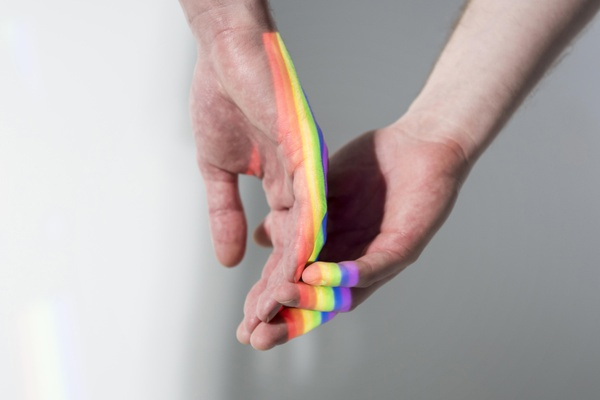
She didn’t respond to porn in the way he did. She didn’t respond to still pictures in the way he did. Toys can be helpful and that can look like a vibrator, anal play, a little vibrating cock ring on him so he gets a little bit and she gets it. This is assuming we are talking about heterosexual sex. I see a lot of couples that have erectile dysfunction going on and they act like it’s the end of the world. I’m like, “You still have a mouth. You still have fingers.”
You sound like my husband when it’s that time of the month. He’s like, “You still have other places.”
I’m like, “They are all sore.” No offense but I have an angry vagina during that time because I have endometriosis fibroids and pelvic floor dysfunction to put it out there. At the same time, I want women to know that I still have orgasms, great sex and all the things. Even with all of that, I was able to have a kid.
Orgasms can help with cramps.
They can help with everything. We have learned on the show too that it can help with a long life. At least that’s what my husband keeps telling me. I wanted to say that a lot of what I’m experiencing personally and I can share this is when I’m relaxed and I know there’s not going to be someone banging on the door. It’s interesting because now we are empty nesters and you know what they say when they are empty-nesters, you will have sex on the kitchen table.
We didn’t have sex on the kitchen table yet but one time we were watching a movie and I was so uncomfortable. It was hot and I took off my shirt. I was sitting there watching the movie topless and my husband looked at me and went, “What are you doing?” I’m like, “This is not a sexual thing. I’m hot and uncomfortable.” I wrapped a blanket around me and I’m like, “I can do this. There’s no one else here that’s going to walk in and it’s the same with sex.” Leave the doors open and walk around. I want to know what you think but a lot of it is relaxing, being comfortable in your body and your space knowing there won’t be an intrusion.
When we are 22, we are walking hormones. It’s easy to access that but as we get older, we are busy, we are raising families and you’ve got a job, it’s hard to tap into that energy because sex is a pleasure. What’s your relationship to pleasure and relaxation? If you are a go-getter, sex isn’t usually top of mind because it’s an option. Shifting into that more erotic mindset sometimes takes some energy, especially for women. There’s a great book that I love called Come as You Are and she talks about accelerators and brakes. I love that. I use that quite a bit with people in sex therapy because most of us know our breaks. We are tired, we have our period, the kids are home or all these things are no. Those are the noes. Those are the things that make me go, “No.”
What are the yeses? What are the accelerators? What are the things that not directly turn you on but prime you to be in a more central headspace? Understanding that those are what is helpful to cultivate. Maybe it’s being bested or for some people, it’s after exercise. A smell can be a big thing for women if they have a lovely oil that they like to put on. That’s why sometimes stretching can a little bit be erotic. Knowing what those things are, gives you a pathway and the more you do it, the more you want it. I usually encourage women to start self-stimulation more frequently because it will ramp them up a little bit.
Somebody that was on the show previously, Dr. Edith Eger happens to be somebody that I know personally. I don’t know if you know who she is but she’s phenomenal. She has mentioned before that having orgasms helps to prevent Alzheimer’s.
She’s so cute. She’s 94 years old.
She’s a sexologist and got her Doctorate in Psychology. She works a lot with people with PTSD and different things. She’s a major bestselling author.
What are some sexual myths that are going around? Is that true in your opinion? We talked about G-spot before you and I talked. There are so many different things that talk about that.
I don’t know about the correlation between orgasm and Alzheimer’s. I have not read that so I can’t verify that. What are other myths?
Can all women have orgasms through sexual intercourse?
Don't neglect the clitoris and lube is our friend! Share on XNo. Know how you can orgasm because way more women can have orgasms clitorally than then through penetrative sex. Newsflash to the men because they were like, “What?” That’s why it’s so important to have foreplay. It’s interesting to me that some men feel put off or sidelined if the woman is touching herself or if she wants a vibrator at the same time as penetration. It’s what works. It’s knowing what works in your body and there’s no shame however you can do it is what I say.
It’s fine. I can do it either way but for a lot of women, it’s one or the other. Thankfully, it’s something. Some women are not orgasmic. I tend to think orgasms are muscle spasms. It’s not this secret little box that we have in there. It’s a muscle spasm and that’s why with a vibrator it’s an involuntary spasm that will occur. Usually, I find that as a lack of awareness in mind-body connection if no orgasm is happening?
What about G-spot?
The G-spot is real but I don’t know if it’s this big quest. I don’t think it feels great to everybody.
Do you guys know of any other myths that you want to question that you have heard?
I know for myself I love pink and sometimes people think that this whole new gender expression and the trans world is an attack on women that are born women as opposed to those that are trans women and I would love it if you would bridge that. Maybe even explain more how we can be an ally to each other instead of, “I’m a born female as opposed to you,” or whatever the languages between that.
I have been mindful since the Equality Act has been up in the ether to be inclusive. Women are democrats where there’s all this happened. We need to come together and we need to support each other. We don’t need friendly fire. That a trans woman is a woman and she should be included and welcomed to the table. There’s enough room. I feel this in general. I want to rise with other women. That’s important. Ultimately, it’s a function of patriarchy keeping women down but it’s something that we execute amongst one another in this way that doesn’t help. I like bringing all women to the table and helping. Trans people, in general, need allies because there are such a small fraction of the population and they are fragile at this point. They need us.
Thank you so much, Jen, for joining us. We certainly covered a lot of everything that you help and work with. How can individuals who are reading contact you if they would like some therapy or even some advice?
I’m only licensed in California so I will give that caveat but you can find me on Instagram at @Riviera_Therapy. I’m on Facebook and Instagram with that address. Be on the lookout. Going forward, I will probably be doing more lectures, speaking, writing and retreats. Thanks for having me.
We appreciate your vulnerability. Everyone here, Michelle, you are going to have to go in. Having these conversations are important for people to understand their own sexuality, their partner and the world. In my opinion, the main thing is loving yourself, getting to know your body, getting to know what both you and your partner, whether it’s the same sex or opposite, love about each other, intimacy, sensuality, support and empowerment. It’s supporting each other and all of the choices that we make. If we can tap into that part of our goddess even by taking little steps, that’s such an accomplishment. Thank you so much for joining us on the show.
Thanks for having me. It’s a good topic and discussion.
—
Welcome everyone to Favorite Things or otherwise known as our Adult Show Intel, where we talk about and share all of the different products, rituals or anything that brings you joy and happiness. We are with our guest, Jenn Kennedy. We are going to go around and share. For me, this has become a favorite activity and it was expressed by another featured goddess, Rachel on our episode was Cheryl Sloane. She talked about Pelvic Floor Therapy and she recommended a woman, a PT therapist here in Chicago and it took months to get into her and now I know why. I go to her. I was told that I needed pelvic floor therapy. I went and they inserted a rod and it was biofeedback. It showed when you clench, you release and how long you clench for. I didn’t find it helpful.
This type of pelvic floor therapy because there are all different kinds, she inserts her finger and she releases and presses like a clock. She goes around to all the areas. After the first one, she stopped and said, “How do you feel?” I said, “Let’s get out a cigarette because I felt like we just had sex.” It was painful but it was a good pain. It was like when you are building muscle. That pain feeling you feel after you work out, you know that it’s good for you. I have been going 6 or 7 times now. I cross my fingers. I haven’t peed in my pants yet and our sex is better. He doesn’t always want me to discuss personal things but I have to tell you that I have more control down there so I feel it more. We can enjoy so much more. My pelvic floor is stronger and I highly recommend it. It’s the best-kept secret I feel for women and it’s important to try and go do. Michelle, what did you bring?

We were talking earlier about loving ourselves and that being a big part, in general, in life, I’m going to cover some of this but this. This is me. I did a boudoir photoshoot. I did it because I have a dear friend whose sister is a professional photographer and that’s what she does. Her business is Boudoir by Nomi. She’s phenomenal. I went to her and I never felt more joy. The reason why I love that picture and in general is because I see the joy. I remember the experience and the joy that I felt.
I may or may not have been a little tipsy while I did it. I looked at it and I had it blown up. There’s a big black and white version on my wall in my room that I’ve got framed. I’m slightly uncomfortable with it because it’s sizable but for me, it represents my power, strength, beauty, sensuality and joy. It was one of the most freeing experiences I have ever had, especially on this new journey of my life. It’s my favorite thing.
I remember when you did it, you were scared to go do it. She did it and I felt your whole spirit lifted. It was so incredible of an activity that you did. It’s so great that you shared it. Thank you for sharing. Camille, what did you bring?
It’s for my eyes. It’s my Nurse Jamie eye thing. I haven’t been sleeping right. I always have to take the battery out because it’s so loud and my husband’s always like, “What are you doing?” I’m like, “It’s allergy season.” I used to be an aesthetician so I feel like I have to bring the things that work for me. It helps with lymphatic drainage. As far as getting some of that swelling down that you might experience. I even go and use it around my eustachian tubes for when it’s all swollen and you are feeling all the nasal leak. You will hear it soon, Karen. I will sound a lot more masculine soon speaking of gender roles.
You have a lot of buzzing electronic vibrating things.
Funny, none of them work down there because I don’t use one. Since I met my husband, I haven’t. Maybe I should have asked this but being an aesthetician, I used to do Brazilians all the time and I would tell women all the time, “The more you get it done, the less sensitive it will be,” I started realizing, “That’s not a place that I want to lose sensitivity.” Even for myself, I stopped waxing there. I stopped using vibrators because I didn’t want only a machine to be able to turn me on, not that I had an addiction yet. At the same time, it’s hard to replicate a machine in a human and expect that same result. My husband wouldn’t care if I shared this but it was almost like a video game with him like, “It’s my goal to see if I can make you first.” If he can’t, he feels like a failure. I’m like, “Go with that. Feel the shame.”
I use a vibrator. I love it. It’s great and helps with our relationship tremendously but there are times when I wonder, Jenn, maybe you can answer this. Can your body get so used to it that it can’t orgasm in other ways if you overuse it?
Yes.
How can you backpedal?
Don’t get dependent on it. Think about it. It vibrates but you can’t replicate that as a human. It’s different so it’s a little bit of a shortcut. It’s good to use. If you are going to use it, use it in combination. Don’t use it as a standalone too much because it’s different. You will habituate like anything else. Sometimes these guys that are masturbating all the time habituate to their hand and you can’t replicate that as a partner. I tell them back off and the body resets. It’s okay. Karen’s like, “Don’t take away my vibrator.”
We use it in combination, which is great but I have to say that I have daughters. They are young adults and I want to tell them to go get a vibrator but I can’t. I wish I knew earlier.
You just did.
Not to overuse it. I want women out there to know about pleasure and you can do this. I was watching Bridgerton. If you watch that he’s the hottest.
Who needs a vibrator with Bridgerton?
The more you do it, the more you want it. Self-stimulation will ramp you up. Share on XIf you saw it, she said to her, “Go touch yourself down there.” I was like, “What?” It was great. It helped inspire a lot of women. You can have this pleasure too. It’s not just about the guys. Jenn, what did you bring after all of our interesting show and tell items?
I went simple and basic. My tea is my friend, I have a bunch of pretty glasses and a bunch of nice teas in the office. I switched away from coffee years ago. I can’t do caffeine anymore. It feels grounding and nurturing to me. It’s cozy. I especially do it all winter long. It feels like a nice little way to take care of myself. As I’m taking in a lot of energy, I’ve got this thing that feels good.
I was going to say, as all therapists you need to create a boundary or a shield because you are taking in a lot, I could imagine and you need to regroup and recharge.
I don’t think of it so much as a shield. It’s interesting because I do take a lot of energy all day long but I have to counterbalance it with lots of self-care, exercise and friends.
Tell us about your self-care.
I don’t usually start working until 11:00 because I work until 7:00. I see a lot of couples and afternoon appointments are the preference for them. I spend my mornings easing into the day with my spouse, getting some exercise and friend time. That’s all. I have to do that otherwise I can feel myself getting edgy. Energetically I have to be able to hold a lot so that requires that care. I do yoga, I hike, I walk with a friend every week and I spin.
We all need self-care. For people reading, you may want to go grab a cup of tea, vibrate an area of your body, go out and get the boudoir photo, frame it, put it on your wall and go check out a PT, a pelvic floor therapist. If you are having pelvic floor issues, I highly recommend it. Thank you for joining us, Jenn, on the show.
Thanks for having me.
Important Links:
- Rivier Therapy
- Come as You Are
- Edith Eger – Past Episode
- @Riviera_Therapy – Instagram
- Facebook – Rivier Therapy
- Cheryl Sloane – Past Episode
- Boudoir by Nomi
- Nurse Jamie
- [email protected]
About Jenn Kennedy
 Jenn Kennedy, LMFT, Certified Sex Therapist and Sex Addiction Therapist based in Santa Barbara, CA.
Jenn Kennedy, LMFT, Certified Sex Therapist and Sex Addiction Therapist based in Santa Barbara, CA.
In my private practice, I specialize in sex and gender. That translates to sex therapy (both for individuals and couples), sex addiction/compulsion (issues with porn, infidelity, prostitution) and LGBT. With these specialties, I have an interesting mix of clients. Recently, my practice has expanded to those looking for more sexual satisfaction and who are also recovering from childhood sexual abuse. I am a certified sex addiction therapist (IITAP), trained in EMDR and work in a variety of modalities—depending on the presenting issue and the disposition of the client.
Currently, I’m working on a Ph.D. in Clinical Sexology. I have taught Intimate Relationships (couples work) and Human Sexuality in graduate school at Antioch University Santa Barbara. My practice is called Riviera Therapy and under this umbrella, I supervise three up-and-coming clinicians who are interested in sex therapy, couples work and sex addiction specializations. Reach me: [email protected] or IG: Riviera_Therapy.
Love the show? Subscribe, rate, review, and share!
Join the Grateful Goddesses Community today:
